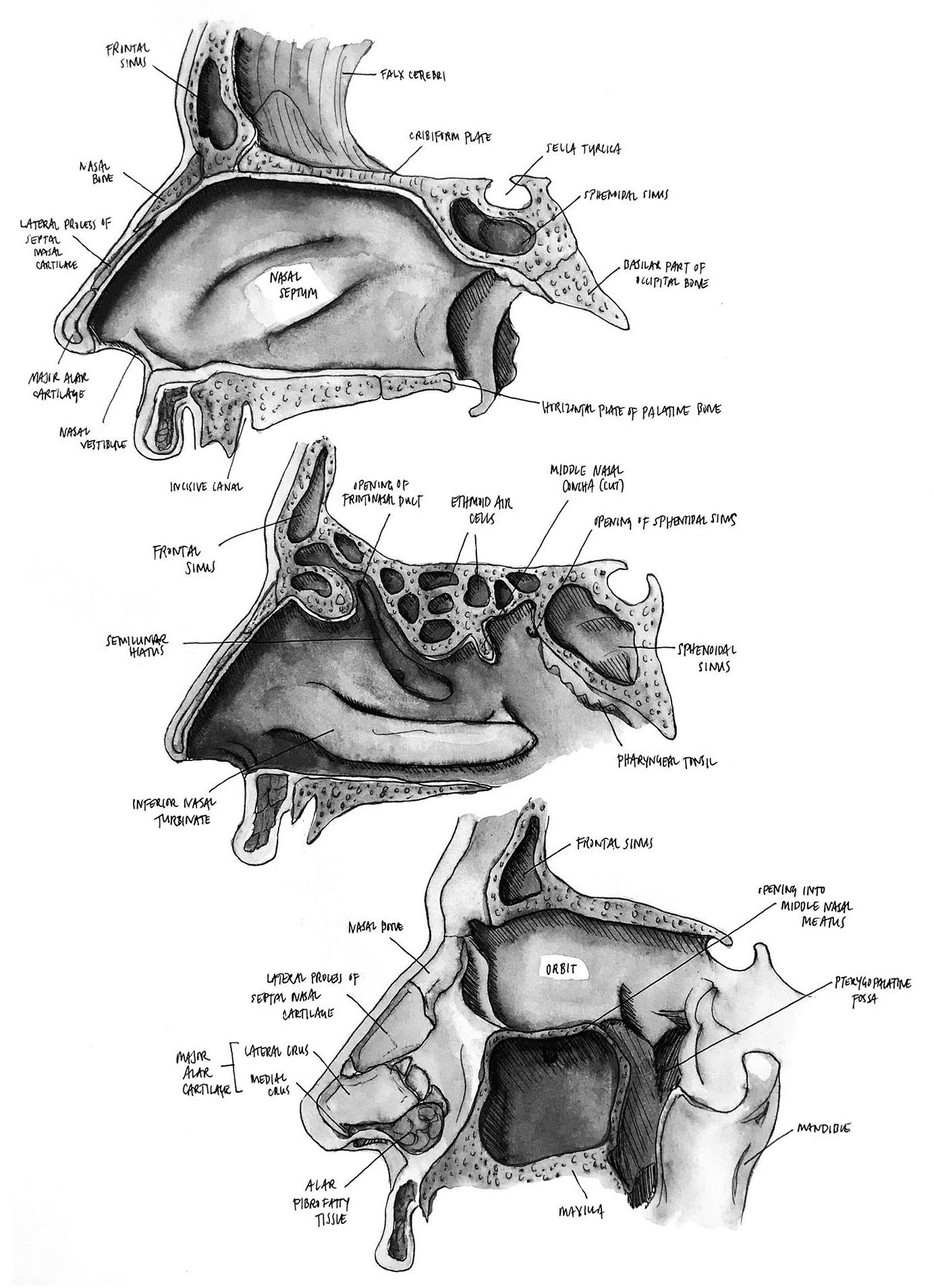
4 minute read
Insurance Fees
Lucas Thornton Insurance Fees
My mother finally paid off my nose. It took four years, several thousand dollars, and a whole lot of frayed nerves, but we finally did it, the three of us. To celebrate, my parents took me to my favorite Thai restaurant. I refrained from getting Thai iced coffee, opting instead for a complimentary glass of water. I also ordered veggie pad Thai instead of my personal favorite, shrimp pad Thai, because shrimp cost a whole four dollars extra. At the end of the dinner, my dad tipped the waitress a five-dollar bill, approximately fifteen percent of our thirty-seven-dollar meal. My mother wanted to give her a dollar or two more. We went there often enough and we considered this waitress sweet, but my father dissuaded my mother by proudly showing her the dark confines of his empty billfold. On the way home, I sit in the backseat of our minivan with my head idle against the headrest. As I watch the few bright lights of my hometown whip past my eyes, my mother, a silhouette, suddenly says, “I can’t believe those doctors.” Which doctors? There were so many, but my dad beats me to the question. “Who are you talking about, hon?” I see my mother’s outline shift toward me. The digital red light of the radio reveals her moving lips. “The county doctors, the ones at the ER. The ones who said we couldn’t get any indigent pay because we didn’t live in the damn county.” “They weren’t any better than the principal. We were just a liability to him. He didn’t want a claim on his hands,” my dad says. And here they are, going at it again. They have been complaining like this for four long years. Of course, they have every right to complain, and it’s certainly cathartic in some instances, but it wears thin, especially for third party spectators who are not as adept in the art of the complaint. I feel far removed from the conversation in the backseat, shrouded in incomplete darkness, struggling to remember all these people who apparently swindled me while I was
Advertisement
still a freshman in high school. That day four years ago was strange, remarkably different from any other day in my life. I awoke at a normal time, I went to school at a normal time, yet I blacked out at a most inopportune time. I can only describe it as an annihilation. I was standing in the bathroom, looking at my boyish freshman face in the mirror, and then nothing. Complete darkness surrounded me. When I came to, I thought I was in bed. Time rewound itself. I was sleeping soundly in my bed. Yet, why was my mattress solid and cold? And why did my nose hurt? Truly strange, I had never unwillingly lost consciousness before. I was not one for taking impromptu naps, but this was no nap. The darkness that engulfed me had been so sudden, so complete, and so direct. I was scared. I didn’t know what to do. I ran back to my classroom and scared everyone. I was a mess, blood dripping down my nose and my skin white as a sheet. Then, the ambulance arrived, “ambalamps” as my dad calls it. But the school nurse inspected me first. I had no history of passing out. Was I on something, drugs? No. Had I drank and ate that morning? Yes, ma’am. Did I have night sweats? Why? Leukemia can make you pass out and you get night sweats with Leukemia. Oh God, my room gets pretty warm at night. A one-way ride to the county hospital cost us $472. I told the medic I didn’t want to cost my parents any more money than I had to, but he just stuck a cold IV needle into my arm. The moment the medics wheeled me into the ER I was struck with a $500 flat fee for stepping foot inside the place. After the EKG was administered, a CT scan was given, and a couple more IVs were put into me, I was left with something more than a flat fee. My mother loves enumerating her woes, so I’ve been told many times that she had to pay thirty percent of the visit’s overall cost ($1500) in addition to a $3000 deductible, as dictated by her policy. And then there was the operation. A real simple surgery that just involved putting me under, shoving some forceps up my nostrils, and rearranging some septum-bone so I could breathe correctly. This thirty-minute procedure cost us $3000, thirty percent of the total amount. Six thousand dollars for two minutes of impromptu darkness seems a
bit strange to me, very strange considering how long this unwholesome amount stayed with us. Four years. Forty-eight months of payments: one to the county hospital, one to the surgery center, and about a half dozen to a handful of elderly nurses and anesthesiologists whom I can’t even recognize in public. But we’re here, riding and complaining. I try my hand at the complaint. “Remember that old nurse who played IV tic-tac-toe on my arm at the ER? She didn’t deserve her twenty-five-dollar monthly check.” “She wasn’t as bad as that idiot ENT who thought rebreaking your nose was a good idea. That was a sixty-dollar conversation right there,” my mom responds. We are almost home now. The lights of the town are all gone. We are on a backroad and everything is pitch black again, except for the red radio. I think everyone’s had their fill of complaints, but I am still annoyed for some reason. I could have gotten shrimp pad Thai and Thai iced coffee tonight, but breaking my nose four years ago prevented me. That’s scary; it’s a butterfly effect almost. My eyes drift toward the window, and I see a willful darkness, one that I expected.



